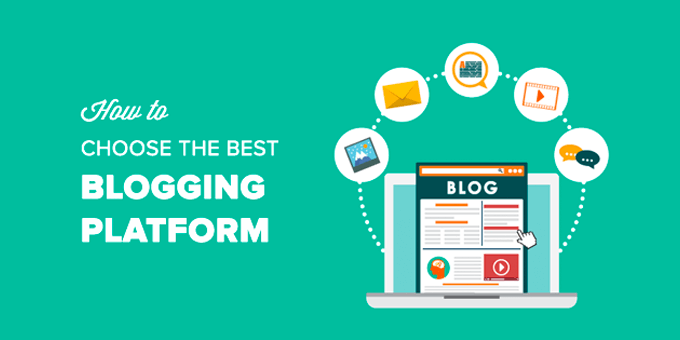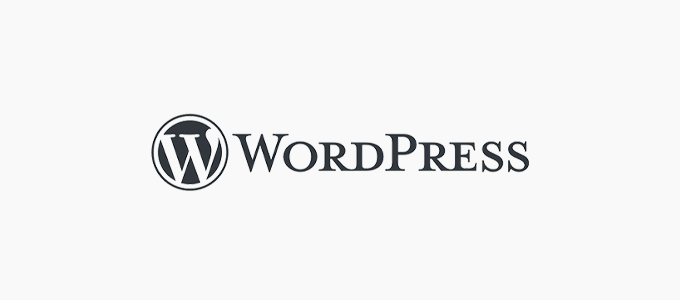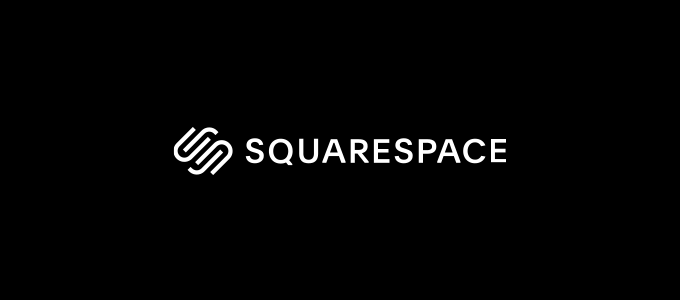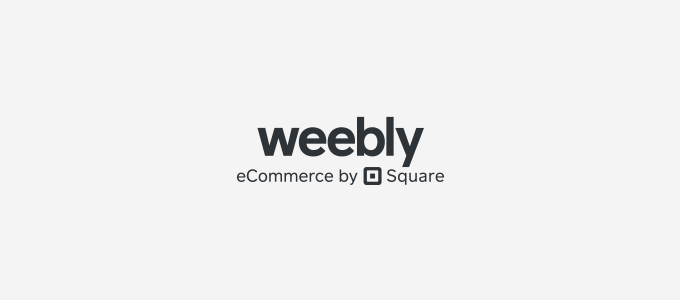Are you looking to start your own blog, but don’t know how to choose the best blogging platform? It’s a tough choice as there are several different blogging platforms out there. How do you know which one is right for you?
In this article, we’ll help you choose the best blogging platform by going over the pros and cons of the most popular blogging sites.

These are the popular blogging platforms we will compare in this article. If you are interested in a particular platform, you can click the link to advance the article.
- WordPress.org
- Web.com
- Wix
- HubSpot CMS
- Gator
- WordPress.com
- Blogger
- Tumblr
- Medium
- Squarespace
- Ghost
- Weebly
Choosing the Best Blogging Platform: What to Look For?
Before you dive into the list, it helps to know what you’re looking for in a blogging platform.
As a beginner, you’ll want a blogging platform that’s easy to set up, has a curve It’s low learning and doesn’t require any coding skills.
You’ll also need to think about what kind of blog you want to create, now and in the future.
p>
As your blog grows, you may want to change the look of your site and add more features for your growing audience. That means it’s important to choose a blogging platform that’s flexible, with room to grow.
Starting with the wrong platform can make it very difficult to change later.
Finally Even if you don’t have plans to make money blogging right now, it’s smart to make sure you have the option to do so in the future.
With all that in mind, let’s compare the best blogging platforms for beginners.
1. WordPress.org

WordPress.org is the most popular blogging software in the world. Created in 2003, WordPress now powers more than 43% of all websites on the Internet.
Note: It is easy to confuse WordPress.org with WordPress.com, which is a blog. . hosting service mentioned later in this list. Check out our guide on the difference between WordPress.org and WordPress.com.
WordPress.org is a free, open source blogging platform that allows you to create your website or blog in minutes.
It’s a self-hosted solution, which means you’ll need to sign up with a WordPress hosting provider. WordPress is a great option if you want full control over the future of your blog.
Advantages
- WordPress.org gives you control over every look of your website.
- You can grow your blog and add additional features like forums, online store, paid memberships and sell online courses. This makes WordPress the best free blogging platform for making money.
- There are thousands of free themes available for WordPress. This allows you to create a beautiful website that stands out from the crowd. The most popular WordPress themes come with built-in customization options that give you full design control without editing any CSS code.
- You also get access to over 59,000 free WordPress plugins. These plugins are like apps for your WordPress blog that allow you to add features like contact forms, galleries, etc. Check out our list of must-have WordPress plugins for every website.
- WordPress is search engine friendly. You can easily create SEO friendly URLs, categories and tags for your posts. Plus, there are a number of great SEO plugins for extra optimization.
- You can easily enable Google Analytics-powered website analytics in WordPress, so you can see the stats that matter. This helps you increase traffic and subscribers to your new blog.
- Last but not least, the WordPress drag and drop editor makes it easy to create any type of content on your blog site. Blog. It also has options to embed dynamic content like videos, social media feeds, Google Adsense, charts, tables and more without any technical knowledge.
Cons
- Managing your own website does come with a bit of a learning curve as you would need to get familiar with the WordPress admin backend.
- You will need to manage your own backups and security.
(usually starting at $7.99/month).
You need a domain name and web hosting to start any kind of website.
WPBeginner users can get started for just $ 2.75 per month with Bluehost, an official WordPress recommended hosting provider. They are offering our users a 60% discount on web hosting and a FREE domain name.
See our guide on how to start a WordPress blog for complete step-by-step instructions.
Overall, WordPress is a great choice for both personal and professional blogs.
p>
Most of the well-known bloggers on the internet use WordPress as their content management system because it is easy to use and comes with all the functionality you will need to create a successful blog.
<p Bonus: In addition to creating a blog site, you can also use WordPress to create a small business website as well as an online store. For more details, check out our detailed guide on how to create a WordPress website.
2. Web.com

Web.com is a well-known website builder platform that comes with the built-in feature to add a blog section to your business website or online store.
your drag
Their website builder makes it easy for you to customize the design of your website and you can even customize the content readers see based on their past behavior.
Benefits
- Easy to use drag and drop website builder that requires no coding skills.
- Quick and easy setup as HubSpot will host your website for you.
- Fully optimized for SEO and conversions.
- Free SSL certificate included.
Cons
- While HubSpot CRM comes with free tools (such as contact management, email marketing, and forms), the CMS does not have a free version available.
- Prices may vary. be elevated as you progress through the levels.
- If you move from another blogging platform, the migration process can be lengthy, depending on your previous provider.
Prices
The HubSpot CMS plan starts at $25 per month and includes all the core features for a well-designed, secure blog, as well as the marketing tools you’ll need to grow it.
For personalized recommendations SEO and advanced features, you’ll want to upgrade to the higher levels.
WPBeginner readers get a 14-day free trial.
Note: You can use WordPress combined with the free HubSpot plugin to combine the power of the best blogging platform and marketing tools.
5. Gator by HostGator

Gator is a website builder and blogging platform created by HostGator, the popular web hosting company we used to host the WPLearn website. Gator offers a dragAfter seeing the limitations, users often switch from WordPress.com to WordPress.org for more features, ease of use, and control over their website.
7. Blogger

Blogger is a free blogging service from Google. It offers a quick and easy way to create a blog for non-techies.
Blogger is one of the first blogging platforms out there. It was first released in 1999 by Pyra Labs. Later, in 2003, Google acquired Blogger and redesigned it into the product we know today.
All you need is a Google account to start a free blog. on Blogger.
Advantages
- Blogger is free.
- It is easy to use and manage without technical knowledge.
- Has the added advantage of a strong secure and reliable platform.
Cons
- Limited to basic blogging tools and you can’t add new features as your blog grows in popularity.
- Design options are limited, with fewer templates available. Third-party blogger templates are often of low quality.
- Blogger does not receive frequent updates or new features.
- Google can suspend your blog at any time or even terminate Blogger’s service completely. . (They have a history of abandoning projects without warning, such as Feedburner.)
For more Blogger pros and cons, check out our WordPress vs. Blogger (pros and cons) comparison.
Some users start with Blogger because it’s free, but eventually, as their blog grows, they end up switching from Blogger to WordPress for more features and control over their website.
Pricing
Blogger is free with a Blogger subdomain like https://example.blogspot.com. If you want to use a custom domain, you must purchase it from a third-party domain registrar.
8. Tumblr

Tumblr is a bit different than other blogging platforms. It’s a microblogging platform with social media features including following other blogs, built-in sharing tools, and more.
Pros
- Tumblr It’s free with a Tumblr subdomain like https://example.tumblr.com. You can also connect a premium custom domain name.
- It’s very easy to set up and use.
- It has a built-in social media platform that makes it easy to discover because there’s an audience.
- As a microblogging tool, Tumblr makes it easy to quickly post video, GIF, image, and audio formats.
Cons/p >
- Tumblr comes with a limited set of features that you can’t expand as your blog grows.
- There are many themes available for Tumblr, but they can’t offer more. features.
- Backing up your Tumblr blog or importing it to other platforms is difficult (see our guide on how to move from Tumblr to WordPress).
Pricing
Tumblr is free to use. You can use a custom domain (purchased separately) for your Tumblr blog, and third-party themes and apps are also available for purchase.
9. Medium

Launched in 2012, Medium has grown into a community of writers, bloggers, journalists and experts. It is an easy to use blogging platform with limited social networking features.
Medium works much like a social networking site where you can create an account and start posting your articles. After registering, you will have a profile address like this: https://medium.com/@yourname. But you can’t use your own domain.
Pros
- Medium is easy to use, requiring no setup or coding skills.
- Allows you to reach an existing online community of people with similar interests.
- You can focus solely on writing, instead of designing a website.
Cons
- Features are very limited in terms of design or branding.
- Medium owns its audience, so losing your blog means losing all your followers.
- You can’t use your own domain name. You will simply get a profile page like on Facebook, e.g. https://medium.com/@yourname.
- You cannot run your own ads to earn money because monetization is limited to their partner program.
To For more comparison, check out our guide on WordPress vs. Medium: Which is Better?
Pricing
Medium is free to use.
While the platform seems appealing at first, the lack of monetization and control causes most people to switch from Medium to WordPress.
10. Squarespace

Squarespace is a website building service that gives you lets you create beautiful websites with easy drag-and-drop tools.It targets small business owners looking for an easy way to build an online presence.
Started in 2003, Squarespace currently powers millions of websites online (source: CMS market share).
Pros
- Squarespace is simple and easy to use for beginners who aren’t very expert in technology.</li
- Has beautiful, professionally designed templates.
- Separately offers a domain name with SSL/HTTP and e-commerce stores.
Cons
- Squarespace is limited to features built into its proprietary platform.
- Integrations are limited to a few services and tools s selected.
See our guide on WordPress vs Squarespace for a more detailed comparison.
Price
Squarespace has different pricing plans for websites and online stores.
Price for your personal website plan starts at $16/month or $12/month if you pay for the year in advance. For the Business plan, pricing starts at $26/mo or $18/mo billed annually.
While pricing for online stores starts from $26/mo up to $40/mo.
Users often end up switching from Squarespace to WordPress to minimize their expenses and add more features to their websites.
11. Ghost

Ghost is a minimalist blogging platform with features entirely focused on writing blog posts. Launched in 2013, Ghost is available as a hosted platform and as software you install/host yourself. We’ll take a look at both options.
Pros
- Focused on blogging and writing.
- Clean, User Interface intuitive and uncluttered.
- Written in JavaScript, so it’s super fast.
- No configuration required for the hosted version.
Cons
- Not easy to customize with apps.
- Simplified user interface means options are very limited.
- Not enough themes to change the look and feel of your site.
- Complicated setup if you install it yourself.
Take a look at our WordPress vs Ghost comparison for more details on the topic.
Price
Self-hosted version requires custom domain (around $14.99/year) and web hosting (starting at $14.99/year). around $7.99/month).
Pricing for the hosted version starts at $29/month for 2 staff users with a 100k page view limit. Unless you purchase a custom domain from a third-party domain registrar, your blog will be a Ghost subdomain ending in ghost.io.
12. Weebly

Weebly is a well-known website building platform owned by the Square payment platform. They offer easy-to-use website building tools for business websites and e-commerce stores.
They also have a blog feature along with free blog templates that you can add to your website.
Benefits
- Fully hosted website and blogging platform.
- Seamless integration with Square payment platform.
- No configuration is required for the hosted website. version.
Cons
- Free plan has limited features and limited bandwidth. It also includes Weebly branding.
- Paid subscriptions are expensive compared to major blogging websites.
- Blogging and SEO features are not as powerful as WordPress.
Take a look at our Weebly vs WordPress comparison for more details on the subject.
If you want to switch from Weebly to WordPress, we have created a detailed step by step tutorial a step on how to successfully migrate from Weebly to WordPress.
Pricing
They have a limited free version that comes with Weebly branding and ads.
Their paid plans start at $8 per month billed annually. The professional plan is $12 per month and their business plan is $25 per month.
Our Pick for Best Blogging Platform
We think WordPress.org beats all other blogging sites out there. blogging. It’s powerful, easy to use, affordable, and the most flexible of all the blogging platforms available. These are all the reasons why you should use WordPress.
To help you start your own WordPress site, we’ve created a comprehensive guide on how to start a blog in 7 easy steps.
If you need help, LearnWP’s team of experts can even help you set up your blog for free. Learn more about our free WordPress blog setup service.
If you’re looking for a WordPress alternative, then our second pick for the best blogging platform would be Web.com or HubSpot.
Your dragYou can also check out our guide on how to create an email newsletter to increase your blog subscribers and our guide on how to create a business email address for your blog.
If you liked this article, please then subscribe to our YouTube channel for WordPress video tutorials. You can also find us on Twitter and Facebook.
.
